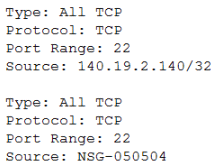At ValidExamDumps, we consistently monitor updates to the Oracle 1Z0-1067-22 exam questions by Oracle. Whenever our team identifies changes in the exam questions,exam objectives, exam focus areas or in exam requirements, We immediately update our exam questions for both PDF and online practice exams. This commitment ensures our customers always have access to the most current and accurate questions. By preparing with these actual questions, our customers can successfully pass the Oracle Cloud Infrastructure 2022 Cloud Operations Professional exam on their first attempt without needing additional materials or study guides.
Other certification materials providers often include outdated or removed questions by Oracle in their Oracle 1Z0-1067-22 exam. These outdated questions lead to customers failing their Oracle Cloud Infrastructure 2022 Cloud Operations Professional exam. In contrast, we ensure our questions bank includes only precise and up-to-date questions, guaranteeing their presence in your actual exam. Our main priority is your success in the Oracle 1Z0-1067-22 exam, not profiting from selling obsolete exam questions in PDF or Online Practice Test.
You have been contracted by a local e-commerce company to assist with enhancing their online shopping application. The application is currently deployed in a single Oracle Cloud Infrastructure (OCI) region. The application utilizes a public load balancer, application servers in a private subnet, and a database in a separate, private subnet.
The company would like to deploy another set of similar infrastructure in a different OCI region that will act as standby site. In the event of a failure at the primary site, all customers should be routed to the failover site automatically.
After deploying the additional infrastructure within the second region, how should you configure automated failover requirements? (Choose the best answer.)
You set up a bastion host in your VCN to only allow your IP address (140.19.2.140) to establish SSH connections to your Compute Instances that are deployed in a private subnet. The Compute Instances have an attached Network Security Group with a Source Type: Network Security Group (NSG), Source NSG: NSG-050504. To secure the bastion host, you added the following ingress rules to its Network Security Group:

However, after checking the bastion host logs, you discovered that there are IP addresses other than your own that can access your bastion host.
What is the root cause of this issue? (Choose the best answer.)
Your deployment platform within Oracle Cloud Infrastructure (OCI) leverages a compute instance with multiple block volumes attached. There are multiple teams that use the same compute instance and have access to these block volumes. You want to ensure that no one accidentally deletes any of these block volumes. You have started to construct the following IAM policy but need to determine which permissions should be used.
allow group DeploymentUsers to manage volume-family where ANY
{ request.permission != , request.permission != , request.permission !=
}
Which permissions can you use in place of in this policy? (Choose the best answer.)
Your company recently adopted a hybrid cloud architecture which requires them to migrate some of their on- premises web applications to Oracle Cloud Infrastructure (OCI). You created a Terraform template which automatically provisions OCI resources such as compute instances, load balancer, and a database instance. After running the stack using the terraform apply command, it successfully launched the compute instances and the load balancer, but it failed to create a new database instance with the following error:
Service error: NotAuthorizedOrNotFound. shape VM.Standard2.4 not found. http status code: 404
You discovered that the resource quotas assigned to your compartment prevent you from using VM.Standard2.4 instance shapes available in your tenancy. You edit the Terraform script and replace the shape with VM.Standard2.2
Which option would you recommend to re-run the terraform command to have required OCI resources provisioned with the least effort? (Choose the best answer.)
You have a web application running on Oracle Cloud Infrastructure (OCI) that lets users log in with a username and password. You notice that an attacker has tried to use SQL comment ''--" to alter the database query, remove the password check and log in as a user. You decide to prevent any future attacks.
Which of the following OCI services or features would you choose to safeguard your application? (Choose the best answer.)
WAF provides you with the ability to create and manage rules for internet threats including Cross-Site Scripting (XSS), SQL Injection and other OWASP-defined vulnerabilities.